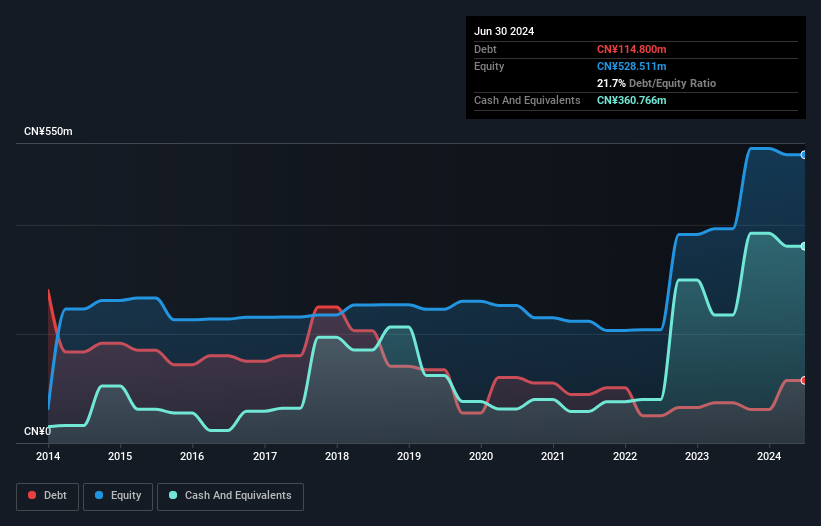Jia Yao Holdings (HKG:1626) Seems To Use Debt Quite Sensibly
David Iben put it well when he said, 'Volatility is not a risk we care about. What we care about is avoiding the permanent loss of capital.' So it might be obvious that you need to consider debt, when you think about how risky any given stock is, because too much debt can sink a company. We note that Jia Yao Holdings Limited (HKG:1626) does have debt on its balance sheet. But is this debt a concern to shareholders?
What Risk Does Debt Bring?
Debt is a tool to help businesses grow, but if a business is incapable of paying off its lenders, then it exists at their mercy. If things get really bad, the lenders can take control of the business. While that is not too common, we often do see indebted companies permanently diluting shareholders because lenders force them to raise capital at a distressed price. Having said that, the most common situation is where a company manages its debt reasonably well - and to its own advantage. When we examine debt levels, we first consider both cash and debt levels, together.
See our latest analysis for Jia Yao Holdings
How Much Debt Does Jia Yao Holdings Carry?
The image below, which you can click on for greater detail, shows that at June 2024 Jia Yao Holdings had debt of CN¥114.8m, up from CN¥74.0m in one year. However, it does have CN¥360.8m in cash offsetting this, leading to net cash of CN¥246.0m.

How Healthy Is Jia Yao Holdings' Balance Sheet?
The latest balance sheet data shows that Jia Yao Holdings had liabilities of CN¥853.9m due within a year, and liabilities of CN¥46.4m falling due after that. Offsetting these obligations, it had cash of CN¥360.8m as well as receivables valued at CN¥343.8m due within 12 months. So its liabilities total CN¥195.7m more than the combination of its cash and short-term receivables.
This deficit isn't so bad because Jia Yao Holdings is worth CN¥842.7m, and thus could probably raise enough capital to shore up its balance sheet, if the need arose. But we definitely want to keep our eyes open to indications that its debt is bringing too much risk. While it does have liabilities worth noting, Jia Yao Holdings also has more cash than debt, so we're pretty confident it can manage its debt safely.
Even more impressive was the fact that Jia Yao Holdings grew its EBIT by 227% over twelve months. That boost will make it even easier to pay down debt going forward. When analysing debt levels, the balance sheet is the obvious place to start. But it is Jia Yao Holdings's earnings that will influence how the balance sheet holds up in the future. So when considering debt, it's definitely worth looking at the earnings trend. Click here for an interactive snapshot.
Finally, a business needs free cash flow to pay off debt; accounting profits just don't cut it. While Jia Yao Holdings has net cash on its balance sheet, it's still worth taking a look at its ability to convert earnings before interest and tax (EBIT) to free cash flow, to help us understand how quickly it is building (or eroding) that cash balance. Over the last two years, Jia Yao Holdings saw substantial negative free cash flow, in total. While investors are no doubt expecting a reversal of that situation in due course, it clearly does mean its use of debt is more risky.
Summing Up
Although Jia Yao Holdings's balance sheet isn't particularly strong, due to the total liabilities, it is clearly positive to see that it has net cash of CN¥246.0m. And we liked the look of last year's 227% year-on-year EBIT growth. So we don't have any problem with Jia Yao Holdings's use of debt. When analysing debt levels, the balance sheet is the obvious place to start. However, not all investment risk resides within the balance sheet - far from it. For example - Jia Yao Holdings has 1 warning sign we think you should be aware of.
Of course, if you're the type of investor who prefers buying stocks without the burden of debt, then don't hesitate to discover our exclusive list of net cash growth stocks, today.
Have feedback on this article? Concerned about the content? Get in touch with us directly. Alternatively, email editorial-team (at) simplywallst.com.
This article by Simply Wall St is general in nature. We provide commentary based on historical data and analyst forecasts only using an unbiased methodology and our articles are not intended to be financial advice. It does not constitute a recommendation to buy or sell any stock, and does not take account of your objectives, or your financial situation. We aim to bring you long-term focused analysis driven by fundamental data. Note that our analysis may not factor in the latest price-sensitive company announcements or qualitative material. Simply Wall St has no position in any stocks mentioned.
 Index Options
Index Options CME Group
CME Group Nasdaq
Nasdaq Cboe
Cboe TradingView
TradingView Wall Street Journal
Wall Street Journal